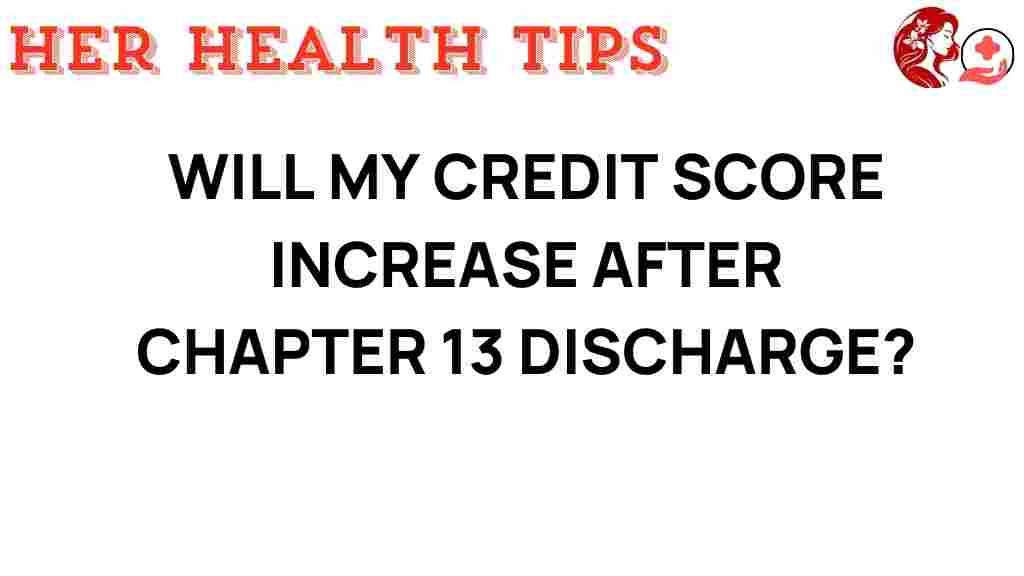Will My Credit Score Soar After Chapter 13 Discharge?
Many individuals facing overwhelming debt often consider options like Chapter 13 bankruptcy for debt relief. One of the most pressing questions that arise during this process is, “Will my credit score soar after Chapter 13 discharge?” Understanding the relationship between a Chapter 13 discharge and your credit score is crucial for anyone seeking financial recovery. In this article, we will explore how a Chapter 13 discharge affects your credit score, the process of credit rebuilding, and essential tips for enhancing your financial literacy.
Understanding Chapter 13 Bankruptcy
Chapter 13 bankruptcy, often referred to as a wage earner’s plan, allows individuals with regular income to create a plan to repay all or part of their debts over three to five years. Here are some key points to understand:
- Debt Limits: Chapter 13 is available to individuals with secured and unsecured debts below a certain threshold.
- Repayment Plan: You will propose a repayment plan to pay off your debts over the specified period.
- Automatic Stay: Filing for Chapter 13 triggers an automatic stay, stopping creditors from pursuing collections.
After successfully completing the repayment plan, you will receive a Chapter 13 discharge, which releases you from personal liability for most debts included in the plan.
Impact of Chapter 13 Discharge on Credit Score
When considering whether your credit score will improve after a Chapter 13 discharge, it’s essential to understand the factors that influence credit scores. Credit scores range from 300 to 850, and various elements contribute to your score, including:
- Payment History (35%): A record of on-time payments impacts your score significantly.
- Credit Utilization (30%): The ratio of your credit card balances to limits.
- Length of Credit History (15%): The age of your credit accounts.
- Types of Credit in Use (10%): A mix of credit accounts, including credit cards and loans.
- New Credit (10%): How many recent credit inquiries you have made.
After a Chapter 13 discharge, your credit score may initially see a drop due to the negative mark of bankruptcy. However, the long-term effects can be more positive, particularly if you follow a strategic plan for credit rebuilding.
Will Your Credit Score Soar After Discharge?
While it’s unlikely that your credit score will soar immediately after your Chapter 13 discharge, it can improve over time. Here are the factors to consider:
- Removal of Debt: Once your debts are discharged, your credit report will reflect a lower debt burden, which can positively affect your credit utilization ratio.
- New Credit Habits: Implementing responsible credit habits post-discharge can lead to gradual improvements in your credit score.
- Time Factor: Credit scores improve with time, especially as older negative marks fade. A Chapter 13 bankruptcy remains on your report for seven years, but its impact diminishes over time.
Step-by-Step Process of Credit Rebuilding After Chapter 13
After receiving your Chapter 13 discharge, follow these steps to rebuild your credit score effectively:
1. Check Your Credit Report
Start by obtaining a copy of your credit report from the three major credit bureaus: Experian, TransUnion, and Equifax. You can request a free report once a year at AnnualCreditReport.com.
2. Review for Errors
Look for any inaccuracies or outdated information in your report. If you find errors, dispute them with the credit bureau to have them corrected.
3. Create a Budget
Establishing a budget is crucial for managing your finances effectively. Ensure you live within your means and allocate funds towards savings and debt repayment.
4. Open Secured Credit Accounts
Consider opening a secured credit card or a credit-builder loan. These types of credit can help you establish a positive payment history and improve your credit utilization.
5. Make On-Time Payments
Consistency is key to rebuilding your credit. Ensure all your bills, including utilities and any new credit, are paid on time. Late payments can significantly impact your credit score.
6. Keep Old Accounts Open
Maintaining older credit accounts can help improve your credit score by increasing the average length of your credit history. Avoid closing old accounts unless necessary.
7. Monitor Your Progress
Regularly check your credit score and report to monitor your progress. Many financial institutions offer free credit score tracking tools.
Troubleshooting Tips for Common Issues
Rebuilding your credit after a Chapter 13 discharge can come with challenges. Here are some troubleshooting tips for common issues:
1. Slow Credit Score Recovery
If your credit score isn’t improving as quickly as you’d like:
- Review your credit utilization ratio and aim to keep it below 30%.
- Ensure you’re making all payments on time; even one late payment can hinder your progress.
- Consider additional credit options, such as becoming an authorized user on a responsible person’s credit card.
2. Being Denied for New Credit
If you’re facing denials for new credit:
- Check your credit report for any derogatory marks or misinformation.
- Start with secured credit cards or credit unions, which may have more lenient requirements.
3. Understanding Credit Inquiries
Be cautious with credit inquiries. Each hard inquiry can temporarily lower your credit score, so limit applications for new credit.
Conclusion
In summary, while your credit score may not soar immediately after a Chapter 13 discharge, it has the potential to improve significantly over time with the right strategies for credit rebuilding. By focusing on financial recovery and practicing good personal finance habits, you can enhance your credit score and achieve greater financial literacy.
Remember, the journey to a better credit score requires patience and discipline. By following the steps outlined in this article, you can navigate the post-discharge landscape and emerge with a stronger financial future. For more resources on personal finance and credit management, consider exploring our financial literacy section.
This article is in the category Fitness and created by HerHealthTips Team
